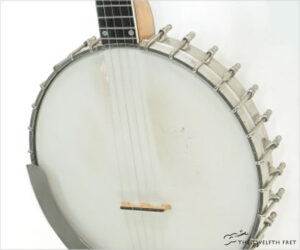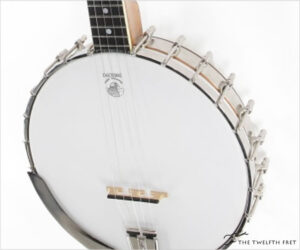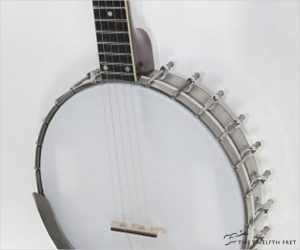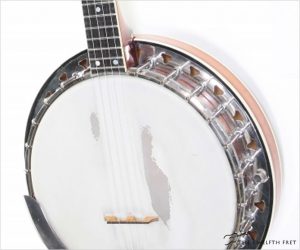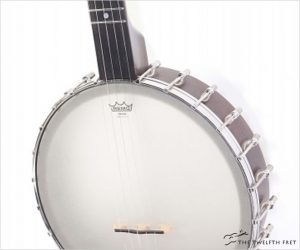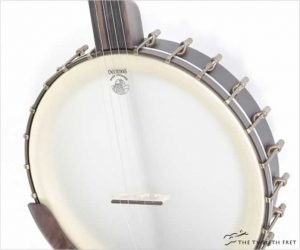Following its original form as an A.C Fairbanks product, the Fairbanks Vega Whyte Laydie featured a natural finish on the maple neck and pot which provided its name. However, the real innovation was the Whyte Ladyie tone ring and bracket band, reducing the number of holes drilled and adding mass to the pot.
Vega
The Deering Vega No.2 Open Back Banjo is based on what was unquestionably one of the most unique banjos in the history of this young and growing instrument. Touted by some as the ultimate banjo tone, it is prized for its full, round and yet sparkling tone and for its depth, responsiveness and power.
This instrument has sold
MORE →This Vega Pete Seeger banjo was purchased by American composer Earl Robinson in 1966 while he was writing his ‘Concerto for Five String Banjo’. This was first performed by the Boston Pops orchestra under Arthur Fiedler. From the late 1930’s into the 1960’s, Earl Robinson composed a number of well known, largely topical pieces including ‘Joe Hill’ ‘Ballad for Americans’, ‘Black and White’ and ‘Lonesome Train’, performed by many top artists.
Here we have a Vega FW5 Folk Wonder, factory converted as new to a Vega Senator. At the time this banjo was built, the Vega name and facilities were owned by the C F Martin guitar company, and a few years later Martin built some higher end Vega banjos in Nazareth PA. The Vega name is now owned by the Deering company, who manufacture excellent Vega models.
The Vega Old Time Wonder is one of Deering’s popular open-back banjo designs, hearkening back to the early days of the Vega company, at a time when the banjo was one of the dominant instruments.
This instrument has sold
MORE →The new Vega Vintage Star open back banjo by Deering has arrived, featuring a classic Dobson-style tone ring, Ebony fingerboard and Satin finish! At the heart of the Vintage Star lies a stunning Dobson tone ring. Originally patented by Henry Dobson in 1881, the Dobson balances the low ends with clear highs, and adds just the right amount of sustain to the banjo. The brass Dobson glows from behind the renaissance head, which itself sits on a thinner walled, 12” violin grade maple rim. A knotless tailpiece tops off the set up to produce a classic old-time tone.
